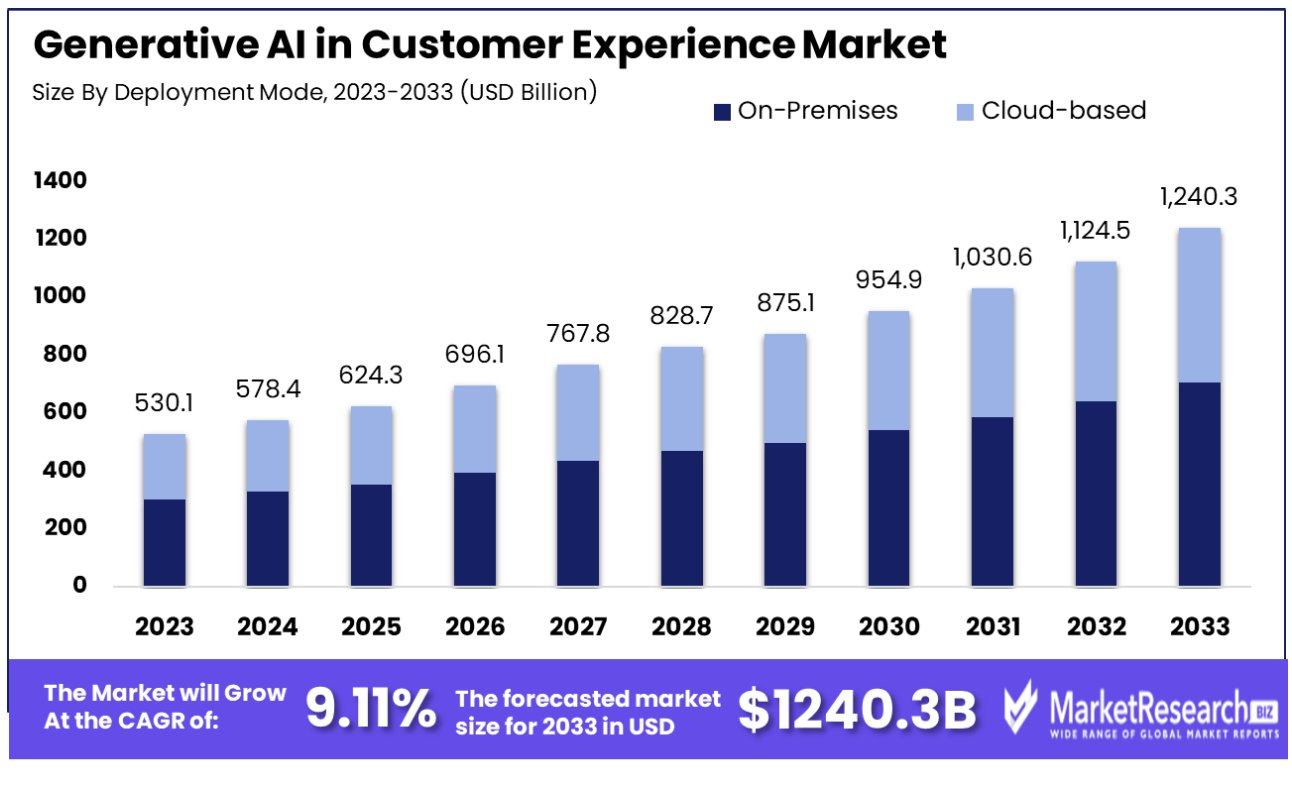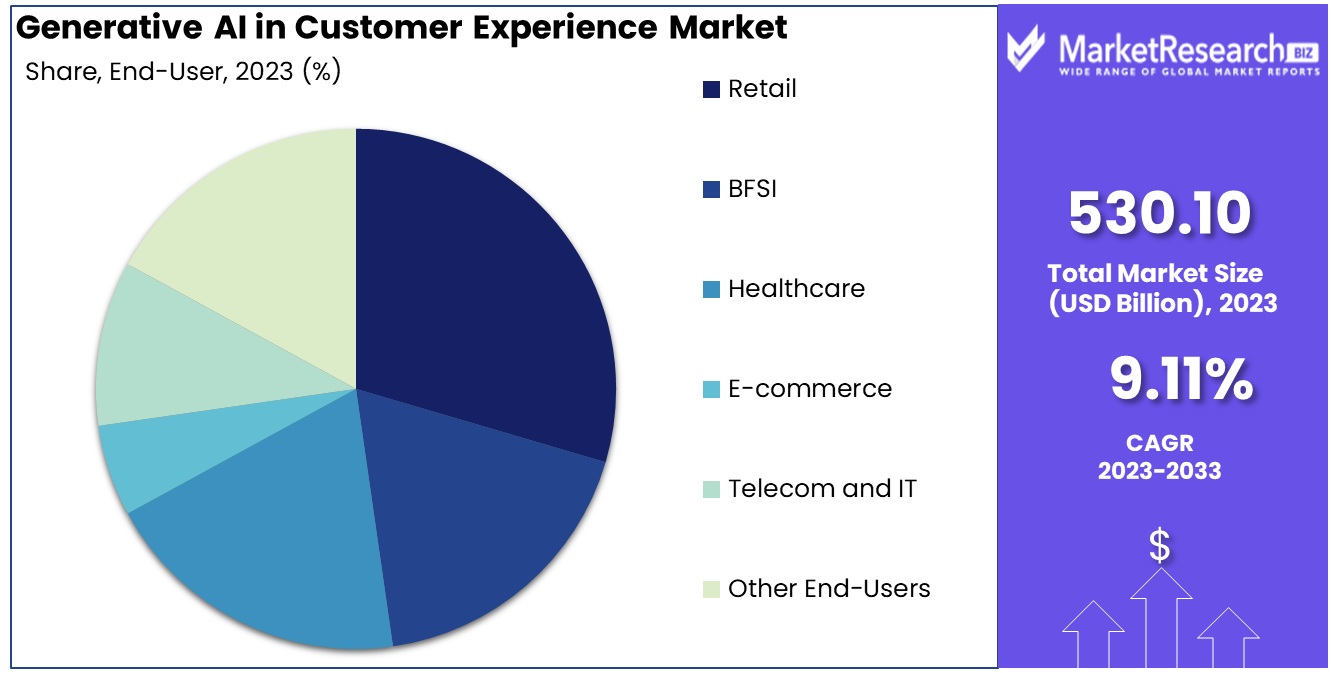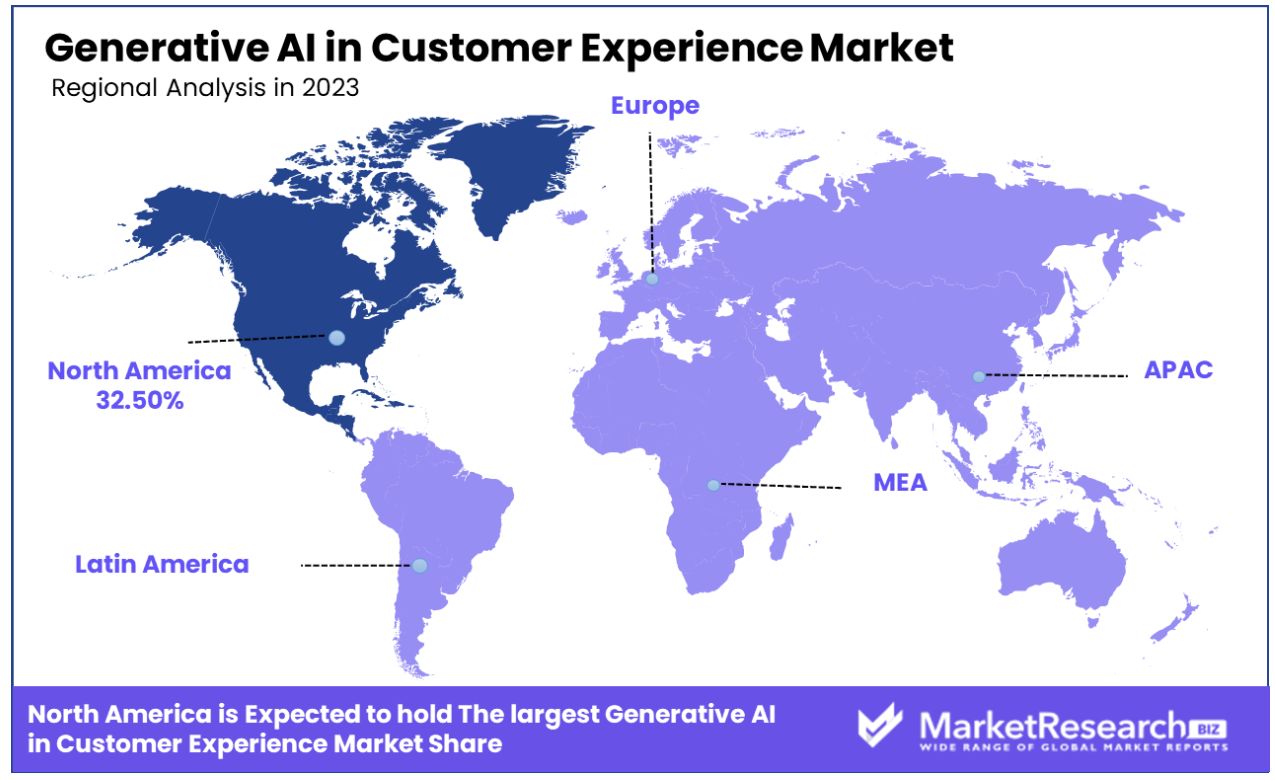
Generative AI in Customer Experience Market Deployment Mode (On-Premises, Cloud-based), Application (Virtual Assistants, Chatbots, Personalized Recommendations, Sentiment Analysis, Other Applications), End-User (Retail, BFSI, Healthcare, E-commerce, Telecom and IT, Other End-Users), By Region And Companies - Industry Segment Outlook, Market Assessment, Competition Scenario, Trends, And Forecast 2024-2033
-
43803
-
Jan 2022
-
178
-
-
This report was compiled by Correspondence Linkedin | Detailed Market research Methodology Our methodology involves a mix of primary research, including interviews with leading mental health experts, and secondary research from reputable medical journals and databases. View Detailed Methodology Page
-
Report Overview
The generative AI in the customer experience market was valued at USD 530.10 Billion in 2023. It is expected to reach USD 1240.3 Billion by 2033, with a CAGR of 9.11% during the forecast period from 2024 to 2033.
The surge in demand for advanced technologies and the rise in customer services are some of the main key driving factors for generative AI in the customer experience market.

Generative AI in customer experience is defined as the use of AI algorithms to improve interactions between businesses and customers. Such technology uses machine learning to analyze huge quantities of customer data, comprised of choices, feedback, and behavior to produce customized and contextually relevant experiences. It allows businesses to automate several aspects of customer engagement, like chatbots that offer real-time support, customized product recommendations, and ready-made marketing communications.
By dynamically implementing individual customer needs and choices, generative AI enhances customer satisfaction, retention, and loyalty. It facilitates the development of interactive content, like customized videos and virtual experiences, that reverberate with customers on a deeper level. This technology also makes forecast modeling, permitting businesses to estimate customer requirements and proactively address issues before they arise.
It changes the customer experience by offering hyper-customized interactions, enhancing responsiveness, and nurturing stronger connections between businesses and their customers. The implementation not only improves customer satisfaction but also propels sales revenue growth and competitive advantages in today’s progressively customer-centric marketplace. According to an article published by CMS Wire in June 2023, highlights that 72% believe generative AI will improve customer experience. In the recent Adobe survey in which 13,000 consumers and 4,250 customer experience and marketing experts were surveyed 72% of the respondents said generative AI will enhance their customer experience. Generative AI was higher with younger consumers with 80% of millennials and 83% of Gen Z in agreement.
It also promises to enhance diversity, equity, and inclusion (DEI) in a brand’s products and services, marketing and advertising campaigns, and hiring techniques. Moreover, according to an article published by BCG revealed that the quality of the car-buying experience is the most vital decision factor for many customers, only 52% of the customers said they are completely satisfied with their most recent car-buying experience.
Generative AI in customer experience provides an ideal approach to customization, forecast modeling, and automation. By analyzing huge datasets, it offers hyper-customized interactions, enhancing customer satisfaction and loyalty. Its forecast potentialities project customer requirements by making proactive engagement. Additionally, it also improves automation through chatbots and customized content creations, simplifying customer interactions. Such technology changes the customer experience, nurturing stronger connections between businesses and customers, propelling revenue growth, and maintaining a competitive edge in the dynamic landscape of the contemporary customer-centric market. The demand for generative AI in customer experience will increase due to its requirement in customer services which will help in market expansion in the coming years.
Key Takeaways
- Market Growth: Generative AI in Customer Experience Market was valued at USD 530.10 Billion in 2023 and is expected to reach USD 1240.3 Billion in 2033, at a CAGR of 9.11%
- By Deployment Mode Analysis: Cloud-based deployment has emerged as the dominant sub-segment in the generative AI in the customer experience market.
- By Application Analysis: Chatbots stand out as the dominant application sub-segment, primarily due to their widespread adoption across customer service channels.
- By End-User Analysis: The e-commerce sector is the predominant end-user of generative AI in customer experience
- Regional Dominance: North America Dominates with 32.50% Market Share
Driving Factors
Demand for Hyper-Personalization Drives Market Growth
Generative AI's ability to offer hyper-personalization is a key driver in the expansion of the customer experience market. By crafting content and experiences uniquely tailored to individual customer preferences, brands can significantly enhance customer engagement and satisfaction. This technology enables the delivery of personalized recommendations, promotions, and communications, meeting the growing consumer expectation for services that cater specifically to their needs. The utilization of generative AI for hyper-personalization not only strengthens customer loyalty but also elevates the brand's value proposition. As businesses strive to stand out in a crowded marketplace, the demand for such personalized interactions is predicted to rise, thereby fueling the market's growth..
Need for 24/7 Customer Service Drives Market Growth
The requirement for continuous customer support has significantly propelled the adoption of generative AI in customer experience strategies. Generative AI chatbots and voice assistants, exemplified by brands like Domino's for order taking, offer round-the-clock service, addressing customer queries instantly and efficiently. This capability not only enhances customer satisfaction through timely assistance but also offers businesses a cost-effective solution to customer service. The scalability of generative AI enables companies to manage fluctuating volumes of customer interactions without the need for additional human resources, thereby optimizing operational costs. The integration of generative AI into customer service is becoming a standard, with its impact on market growth expected to increase as technologies evolve and consumer expectations for immediate support grow.
Competitive Differentiation Drives Market Growth
The adoption of generative AI for competitive differentiation is markedly influencing the growth of the customer experience market. Innovators and early adopters of technologies like DALL-E, which generates unique visual content, are setting new benchmarks in customer experience. This not only helps brands stand out by offering novel and engaging customer interactions but also establishes a competitive advantage that can significantly impact market positioning. The use of generative AI in creating distinctive customer experiences not only attracts more consumers but also builds a memorable brand identity. As businesses increasingly recognize the value of generative AI in differentiating their customer offerings, investment in these technologies is expected to surge. This trend underscores a broader movement towards innovation-driven competition, where the ability to leverage advanced AI capabilities becomes a critical determinant of market success..
Restraining Factors
Data Privacy Concerns Restrains Market Growth
The reliance of generative AI on vast quantities of customer data introduces significant data privacy challenges, acting as a major restraint on the growth of the AI in customer experience market. Consumers' apprehension about how their data is collected, used, and shared undermines trust in brands utilizing generative AI technologies. The absence of transparent data governance policies exacerbates these concerns, making customers hesitant to engage with AI-driven experiences. This reluctance can stifle adoption rates, as businesses struggle to assure customers of their commitment to data protection. Establishing clear, robust data governance frameworks is crucial to mitigating these fears and unlocking the market's full potential, underscoring the need for industry-wide standards on data privacy and security.
Poor Quality Outputs Restrains Market Growth
The production of incoherent, biased, or inappropriate content by generative AI models poses a significant challenge to the growth of the AI in customer experience market. Such outputs can damage a brand's reputation, eroding consumer trust and loyalty. The necessity for human oversight to ensure the quality and relevance of AI-generated content adds to operational costs, diminishing the cost-effectiveness that makes generative AI attractive. This issue highlights the current limitations of AI technologies in fully understanding and replicating human nuances in communication.
By Deployment Mode Analysis
Cloud-based deployment has emerged as the dominant sub-segment in the generative AI in the customer experience market. This dominance is driven by the cloud's scalability, flexibility, and cost-effectiveness, allowing businesses of all sizes to implement AI solutions without significant upfront investment in hardware or specialized personnel. Cloud platforms enable rapid deployment and iteration of AI models, facilitating more dynamic and responsive customer experience strategies. Additionally, cloud services often come with advanced AI and analytics tools, reducing the barrier to entry for businesses looking to leverage generative AI capabilities.
The on-premises segment, while important, is increasingly seen as less flexible and more resource-intensive, particularly for small and medium-sized enterprises (SMEs). However, it remains critical for sectors with stringent data security and privacy regulations, offering tighter control over data storage and processing.
By Application Analysis
Chatbots stand out as the dominant application sub-segment, primarily due to their widespread adoption across customer service channels. They offer 24/7 support, handling a vast array of queries with increasing sophistication and personalization, thanks to advancements in natural language processing and generative AI. This not only improves customer satisfaction but also significantly reduces operational costs for businesses.
Other application segments like virtual assistants, personalized recommendations, and sentiment analysis also play vital roles in enriching customer experience. Virtual assistants offer voice-activated support, personalized recommendations enhance the shopping experience with tailored suggestions, and sentiment analysis provides insights into customer feelings and attitudes, enabling more nuanced customer engagement strategies.
By End-User Analysis
The e-commerce sector is the predominant end-user of generative AI in customer experience, driven by the need to personalize shopping experiences, manage vast product catalogs, and provide efficient customer support. E-commerce platforms leverage AI for personalized recommendations, chatbots, and more, enhancing the customer journey and boosting sales.

Other end-user segments like retail, BFSI (Banking, Financial Services, and Insurance), healthcare, and telecom and IT also significantly benefit from generative AI applications. In retail, AI enhances in-store experiences and online shopping; in BFSI, it offers personalized financial advice and fraud detection; healthcare uses it for patient engagement and support; telecom and IT improve service operations and customer care.
Generative AI in Customer Experience Industry Segments
Deployment Mode
- On-Premises
- Cloud-based
Application
- Virtual Assistants
- Chatbots
- Personalized Recommendations
- Sentiment Analysis
- Other Applications
End-User
- Retail
- BFSI
- Healthcare
- E-commerce
- Telecom and IT
- Other End-Users
Generative AI in Customer Experience Market Growth Opportunities
Enhanced Chatbots Offer Growth Opportunity
The advent of more sophisticated generative chatbots, exemplified by developments like Anthropic's Claude, which can grasp context, engage in natural dialogues, and deliver personalized recommendations, presents significant growth opportunities in the customer experience market. Unlike their rule-based predecessors, these advanced chatbots can drastically improve customer service by offering responses that feel more human-like and are tailored to the individual needs of the customer. This enhancement in chatbot capabilities not only elevates the customer experience but also increases efficiency and reduces operational costs for businesses.
Individualized Content Offers Growth Opportunities
Generative AI's capacity to produce individualized content, from tailored product configuration recommendations to unique welcome offers for each customer, underscores a vast growth opportunity within the customer experience sector. Personalization is a key driver of customer engagement and loyalty, with consumers increasingly expecting interactions with brands to reflect their specific preferences and history. The use of generative AI to create content that caters to these expectations not only enhances the customer experience but also boosts conversion rates and brand loyalty.
Generative AI in Customer Experience Market Trending Factors
Integration of Multimodal AI Interactions
The trend towards integrating multimodal AI interactions, which combine text, voice, visual, and sometimes touch inputs for a more comprehensive and natural user experience, is rapidly gaining traction. This approach leverages generative AI to interpret and respond to various forms of user input, enabling more nuanced and versatile customer interactions. For instance, customers can receive support through a seamless blend of chatbots for text-based queries and voice assistants for hands-free communication, enriched with visual aids when necessary. This trend caters to the growing consumer demand for more interactive, efficient, and human-like digital experiences, significantly enhancing customer satisfaction and engagement.
Ethical AI and Transparency
As generative AI becomes more embedded in customer experience solutions, ethical AI and transparency are emerging as critical factors. Consumers and regulators alike are increasingly concerned about how AI systems make decisions, the data they use, and the potential for bias. In response, companies are focusing on developing and deploying AI solutions that are not only effective but also ethical and transparent. This includes efforts to make AI decisions more explainable, ensure data privacy, and mitigate biases in AI-generated content.
Generative AI in Customer Experience Market Regional Analysis
North America Dominates with 32.50% Market Share
North America's leadership in the Generative AI in Customer Experience Market, commanding a 32.50% share, is attributable to several key factors. The region's strong technological infrastructure, significant investments in AI and machine learning, and a robust ecosystem of startups and established tech giants fuel innovation and adoption. Additionally, North America benefits from a highly digital-savvy consumer base that demands sophisticated, personalized customer experiences, driving businesses to adopt generative AI solutions. The presence of leading AI research institutions and favorable government policies supporting AI development further strengthen this dominance.

The market dynamics in North America are characterized by rapid technological advancement and a competitive landscape that pushes companies to innovate continuously. This environment not only promotes the growth of generative AI in customer experience but also sets global standards for its application.
Looking ahead, North America's influence in the global market is expected to persist. The region's commitment to advancing AI technologies, coupled with substantial financial backing and a culture of innovation, positions it well to remain at the forefront of generative AI development and application. This ongoing leadership is likely to have significant implications for the direction of the global market, influencing trends, standards, and regulatory frameworks.
Europe's Strategic Growth in Generative AI
Europe holds a significant position in the Generative AI in Customer Experience Market, driven by its strong emphasis on data protection and privacy, alongside substantial investments in AI research and development. The region's advanced digital infrastructure and the proactive adoption of AI across various industries, including finance, healthcare, and retail, contribute to its market share. Europe's regulatory framework, particularly the General Data Protection Regulation (GDPR), while stringent, has encouraged the development of AI solutions that prioritize ethical considerations and data privacy, setting a benchmark for responsible AI deployment globally.
Asia-Pacific Emerges as a Dynamic Player
The Asia-Pacific region is rapidly emerging as a dynamic player in the Generative AI in Customer Experience Market, driven by its large, tech-savvy population and increasing digitalization across sectors. Countries like China, Japan, and South Korea are making significant strides in AI research and development, supported by government initiatives and investments. The region's manufacturing prowess, coupled with its push towards digital transformation, provides a fertile ground for the adoption and integration of generative AI technologies.
Generative AI in Customer Experience Industry By Region
North America
- The US
- Canada
- Rest of North America
Europe
- Germany
- France
- The UK
- Spain
- Netherlands
- Russia
- Italy
- Rest of Europe
Asia-Pacific
- China
- Japan
- Singapore
- Thailand
- South Korea
- Vietnam
- India
- New Zealand
- Rest of Asia Pacific
Latin America
- Mexico
- Brazil
- Rest of Latin America
Middle East & Africa
- Saudi Arabia
- South Africa
- UAE
- Rest of Middle East & Africa
Generative AI in Customer Experience Market Competitive Analysis
In the Generative AI in Customer Experience Market, key players such as IBM Corporation, Google LLC, Microsoft Corporation, Salesforce.com, Inc., Oracle Corporation, SAP SE, Amazon Web Services, Inc., Nuance Communications, Inc., and Genesys Telecommunications Laboratories, Inc., along with other significant entities, play pivotal roles in shaping the industry's landscape. These companies are at the forefront of integrating AI into customer experience solutions, offering advanced platforms and tools that enable businesses to provide personalized, efficient, and engaging customer interactions. Their strategic positioning revolves around innovation, with considerable investments in research and development to enhance AI capabilities, ensuring their offerings remain cutting-edge.
The impact of these key players extends beyond their technological advancements; they influence market trends, set industry standards, and drive competitive dynamics. Through collaborations, acquisitions, and partnerships, they expand the generative AI ecosystem, fostering a network of services that enhance the customer experience across various industries. Their market influence is also evident in their ability to shape consumer expectations and business strategies, making the adoption of AI in customer experience a strategic imperative for companies looking to maintain competitive advantage.
Generative AI in Customer Experience Industry Key Players
- IBM Corporation
- Google LLC
- Microsoft Corporation
- Salesforce.com, Inc.
- Oracle Corporation
- SAP SE
- Amazon Web Services, Inc.
- Nuance Communications, Inc.
- Genesys Telecommunications Laboratories, Inc.
- Other Key Players
Generative AI in Customer Experience Market Recent Development
- Dec 2023 Amazon CEO Andy Jassy said generative AI will change the customer experience in the company’s enterprise and discretionary consumer business.
- Oct 2023 Innervate, the dynamic customer experience company, announced a powerful next generation of its industry-first AI-powered Digital Asset Management (DAM) solution.
Report Scope
Report Features Description Market Value (2023) USD 530.10 Billion Forecast Revenue (2033) USD 1240.3 Billion CAGR (2024-2032) 9.11% Base Year for Estimation 2023 Historic Period 2016-2023 Forecast Period 2024-2033 Report Coverage Revenue Forecast, Market Dynamics, COVID-19 Impact, Competitive Landscape, Recent Developments Segments Covered Deployment Mode (On-Premises, Cloud-based), Application (Virtual Assistants, Chatbots, Personalized Recommendations, Sentiment Analysis, Other Applications), End-User (Retail, BFSI, Healthcare, E-commerce, Telecom and IT, Other End-Users) Regional Analysis North America - The US, Canada, Rest of North America, Europe - Germany, France, The UK, Spain, Italy, Russia, Netherlands, Rest of Europe, Asia-Pacific - China, Japan, South Korea, India, New Zealand, Singapore, Thailand, Vietnam, Rest of Asia Pacific, Latin America - Brazil, Mexico, Rest of Latin America, Middle East & Africa - South Africa, Saudi Arabia, UAE, Rest of Middle East & Africa Competitive Landscape IBM Corporation, Google LLC, Microsoft Corporation, Salesforce.com, Inc., Oracle Corporation, SAP SE, Amazon Web Services, Inc., Nuance Communications, Inc., Genesys Telecommunications Laboratories, Inc., Other Key Players Customization Scope Customization for segments, region/country-level will be provided. Moreover, additional customization can be done based on the requirements. Purchase Options We have three licenses to opt for Single User License, Multi-User License (Up to 5 Users), Corporate Use License (Unlimited User and Printable PDF) -
-
- IBM Corporation
- Google LLC
- Microsoft Corporation
- Salesforce.com, Inc.
- Oracle Corporation
- SAP SE
- Amazon Web Services, Inc.
- Nuance Communications, Inc.
- Genesys Telecommunications Laboratories, Inc.
- Other Key Players




